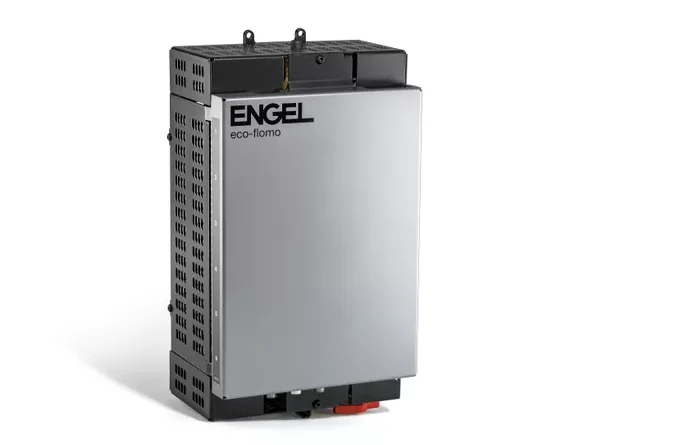Engel presents new eco-flomo temperature manifold at Fakuma 2023
Schwertberg, Austria – Mold temperature control has a significant impact on product quality and the energy efficiency of the injection molding process. To take even greater advantage of the resulting potential for process optimization, ENGEL is making it easy to get started with electronic temperature difference monitoring, beginning with the new eco-flomo temperature control water manifold system at the Fakuma 2023 trade show.
The new eco-flomo temperature control system is suitable for continuous monitoring of all injection mold cooling and temperature control circuits and ensures transparency during the temperature control process. It detects irregularities to help boost process stability and reliability.
eco-flomo is integrated into the ENGEL injection molding machine’s CC300 control unit. To make this possible, the new temperature control system uses the iQ flow control software platform for mold temperature control developed by ENGEL. The pressure, temperature and flow rate values are presented on the machine display in a neat and easy-to-understand format. These numbers are also saved on the system to ensure complete documentation – for instance, to satisfy record-keeping requirements in the medical technology or automotive industries.
The eco-flomo is available in two different designs: a basic version for straightforward flow rate and temperature difference monitoring and the eco-flomo plus version, which also comes with manually operated valves. These valves make it possible for the machine operator to manually set the flow rate in the individual temperature control circuits to suit their specific needs.
Relative to its predecessor (the flomo), the eco-flomo’s performance levels have been enhanced, with the maximum temperature increasing to 120°C. The maximum pressure is 10 bar.
In launching the first flomo electronic temperature control water manifold system, ENGEL was making advances in the mold temperature control space as far back as K 2010. ENGEL was an early mover when it came to laying the foundations for greater transparency and consistency in the temperature control process. A few years later, this was followed by the e-flomo, which can use flow rate monitoring to automatically control either the flow rates or the temperature difference in each and every circuit. iQ flow control then saw ENGEL take the next step. This software is capable of connecting the e-temp-series temperature control units and the injection molding machine via OPC UA to create a single unit. It is also able to control the pump speed in the temperature control units in line with the operator’s needs based on the values measured by the e-flomo. This reduces energy consumption by up to 85 percent.
To take full advantage of the potential offered by integrated temperature control, ENGEL has developed the new eco-flomo and eco-flomo plus to allow for upgrades at any time. Only the hardware needs to be replaced ahead of an upgrade, as eco-flomo and eco-flomo plus already use the iQ flow control platform.
ENGEL will be exhibiting the new eco-flomo taking on a number of challenging applications from 17 to 21 October at Fakuma 2023 in Friedrichshafen, Germany. For instance, the e-victory injection molding machine for the production of high-precision umbrella valves from LSR comes fully fitted with the new temperature control water manifold system. The umbrella valves are just 7 millimetres in diameter and are made in a 64-cavity mold. Consistent temperature control is essential for ensuring high-quality parts throughout.
In the medical exhibit at ENGEL’s booth, the company will be making pen needle shields for hypodermic syringes from polypropylene in a 96-cavity mold on an all-electric e-mac injection molding machine. As part of this application, the temperature control circuits will be split between the eco-flomo and the e-flomo. Both systems’ measured values are displayed on a shared screen page on the e-mac machine’s CC300 control unit.
Temperature control errors continue to be a highly frequent cause of rejects in injection molding production. In addition, temperature control accounts for more than 40 percent of energy consumption in injection molding. From ENGEL’s perspective, these two factors have been the motivation to devote almost 15 years of considerable effort into injection molding temperature control processes and continuing to expand its product platform for integrated, electronically monitored and efficiency-driven process temperature control.

